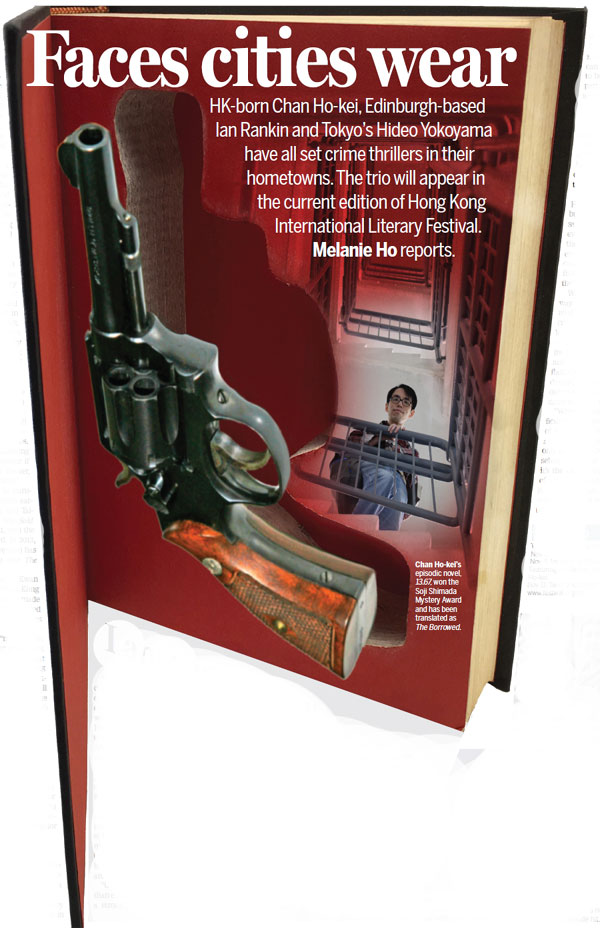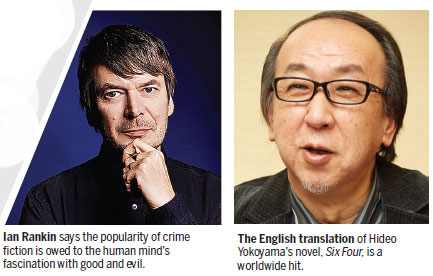Faces cities wear

HK-born Chan Ho-kei, Edinburgh-based Ian Rankin and Tokyo's Hideo Yokoyama have all set crime thrillers in their hometowns. The trio will appear in the current edition of Hong Kong International Literary Festival. Melanie Ho reports.
In mystery writer Chan Ho-kei's novel, 13.67, the city of Hong Kong is as much of a character as the book's protagonist, the "genius detective" Kwan Chun-dok. Similarly, Ian Rankin's Inspector Rebus series of novels are quite centered on his hometown. The city of Edinburgh, says Rankin, "is the main character in my books. I can't imagine setting my stories anywhere else."

Rankin's Edinburgh, Chan's Hong Kong and the Japanese writer Hideo Yokoyama's Tokyo - especially the dark and mysterious facets of these cities - will be under focus at the 2017 edition of the Hong Kong International Literary Festival (HKILF), which kicks off tonight.
Hong Kong-born Chan's first brush with detective fiction was in primary school. It was a story from The Adventures of Sherlock Holmes which Chan first read in Chinese translation. "I fell in love with Conan Doyle's work. Later in my teenage years, I came across some Japanese mystery novels, which also had an impact on me," recalled Chan, adding, "I think Conan Doyle had a big influence on me. The detective characters I create always have some Holmesian characteristics." Then Chan, who has written three novels, says he was influenced by all sorts of crime novels from the classics to more modern, realist stories. "I always think I can gain something from any book I read, no matter if it's a John Le Carre, Jeffery Deaver, Gillian Flynn or Agatha Christie."
Chan's latest book (yet to be translated in English) was published earlier this year in Hong Kong and Taipei. His first novel, The Man Who Sold the World, published in 2011, won the Soji Shimada Mystery Award. In 2013, he wrote 13.67. Its English version has been published under the title The Borrowed.
The Borrowed tells the story of Kwan Chun-dok's career with the Hong Kong Police Force, during which he is made to deal with different crime-related cases, taking place at five key moments in Hong Kong history. The twist is that Chan writes each of these "novellas" in reverse order and the reader begins not with Kwan's first case as a detective, but in 2013 with the murder of a Hong Kong billionaire. The novellas are interconnected. A location used in one novella will appear again in the future (or, rather, the past), which is a way of showing the city's evolution down the ages.
"A highly-populated area is always a good place for crime, in both reality and fiction," Chan says. "Moreover, Hong Kong is like a locked room. In the US or other countries, a criminal can easily flee from the place where he commits the crime - like escaping from New York and heading to the West Coast - making it difficult for the police to track him down. However, in Hong Kong a common criminal has nowhere to run. The city is a perfect setting for mystery novels, don't you think?"
A mirror of society
Rankin, who is visiting Hong Kong for the first time to attend HKILF, wasn't sure he would write another one after publishing his first Rebus novel in 1987.
"But I wanted to write about contemporary urban society and the problems people face in such a society, and I decided Rebus was perfect for this," says Rankin. "The detective can investigate society from top to bottom. Each book has been part of this exploration as I try to construct a complete picture of life in Edinburgh between 1987 and the present day. Thirty years on, that process is still not complete!"
Earlier in the year, Rebusfest - a festival celebrating 30 years of Rankin's detective - drew a huge crowd of fans from the world over to Edinburgh.
"To me Edinburgh is a 'Jekyll and Hyde' city, civilized on the surface but with savagery lurking beneath," says Rankin. "Edinburgh is also an evolving city, and I try to show all these facets in my books." To that end, Rankin said that he uses real locations as much as possible, ranging from the street his detective lives on to the bar he drinks in.
What sets Chan's novels apart is the way he ditches the generic locations used all too often by writers setting crime thrillers in Hong Kong - the bar-lined alleys of Wan Chai, for example - in favor of terrains that are relatively fresh. Chan's detectives ride the minibus and live in typically-sized Hong Kong flats. Chan says he felt strongly about such details, although he didn't deliberately set out to write about all of Hong Kong. It all came together naturally.
"When talking about Hong Kong crime fictions or movies, Westerners might think of kung fu, Jackie Chan, hard-boiled cops and gangsters," says Chan. These are not the only elements about the city that lend themselves to a crime thriller, he adds. Chan says it's the city's several different faces - some of which he has been familiar with since his growing up years - that fascinate him as a writer. "I think it would be very interesting using these faces."


(HK Edition 11/03/2017 page10)
Today's Top News
- Xi replies to letter from teachers and students of US youth education exchange delegation
- China to beef up personal data protection in internet applications
- Beijing and Dar es Salaam to revitalize Tanzania-Zambia Railway
- 'Kill Line' the hidden rule of American governance
- Warming of oceans still sets records
- PBOC vows readiness on policy tools





























